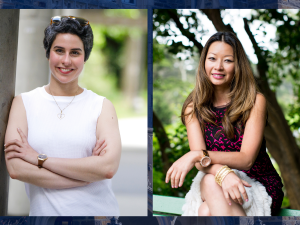Nicki Washington tackles issues of equity and inclusion in computer science
Nicki Washington – author, educator and professional disruptor – has come home with a mission. Washington grew up in Durham, where her mom worked as a programmer and manager with IBM. She learned coding as a child and in 2005 became the first African-American woman to receive a Ph.D. in computer science from North Carolina State University. In a career that spans both industry and academia, Washington has focused her work on addressing the diversity, equity, and inclusion issues at all levels.
As newly appointed Professor of the Practice with Duke Computer Science, Washington has returned home at a critical time for the university and the culture at large. As a Black woman in computer science, Washington provides a crucial perspective on issues of racial diversity and gender balance in the field.
“I'd say my first hope is that everyone stops looking at gender and race as two disjoint identities to discuss,” she says. “Words matter and we have to change the language to properly change the narrative. Women are not a monolith. Likewise, women of color aren't a monolith.”
Washington hopes that the Duke community can center these issues, especially in computing and other STEM disciplines, in ways that leverage the expertise of scholars and social scientists already on campus. “I think there should be more support for creating inclusive environments,” she says. “This has to be from the top down and long-term.”
Improving computer science education at all levels has been an abiding passion for Washington. She’s done extensive work on the K-12 CS Framework and other initiatives that provide core education but also work toward overcoming the non-technical barriers that still exist for many students.
“I look at my mom's experiences in computing, and they mirror mine,” Washington says. “They also mirror the experiences of the Black women students I've taught who, in recent years, have reached out to me about their own issues with racism.”
Washington says she tries to maintain a guarded optimism about the direction that computer science is going, but these evolving concepts have really only worked for a small number of people in the field. “I’ll be more optimistic when I see more teaching about the barriers to success that have nothing to do with one's ability to program or develop computational thinking skills – things like racism, sexism, classism, ableism, homophobia, etc. I think every generation should be improving upon the experiences of their predecessors.”




